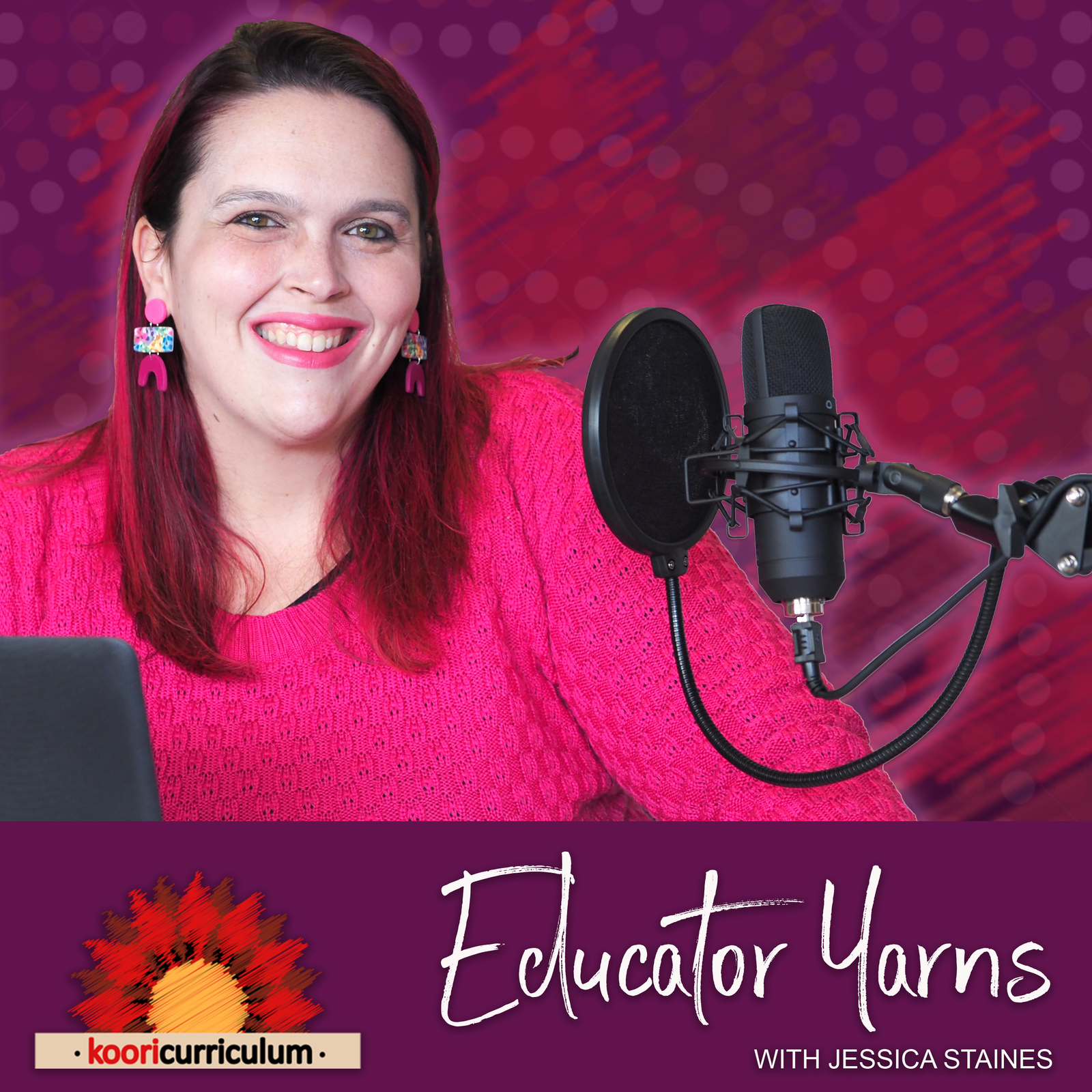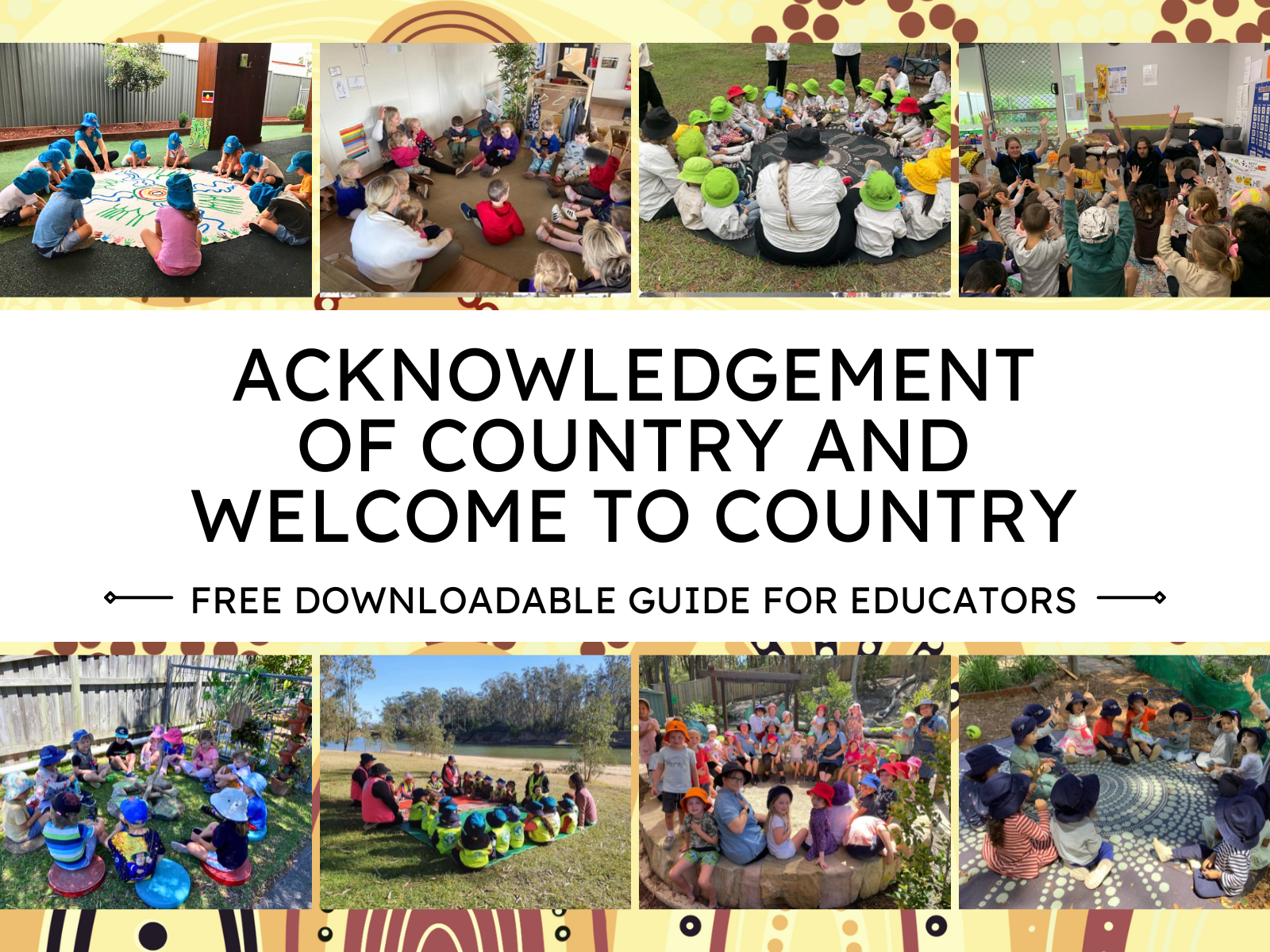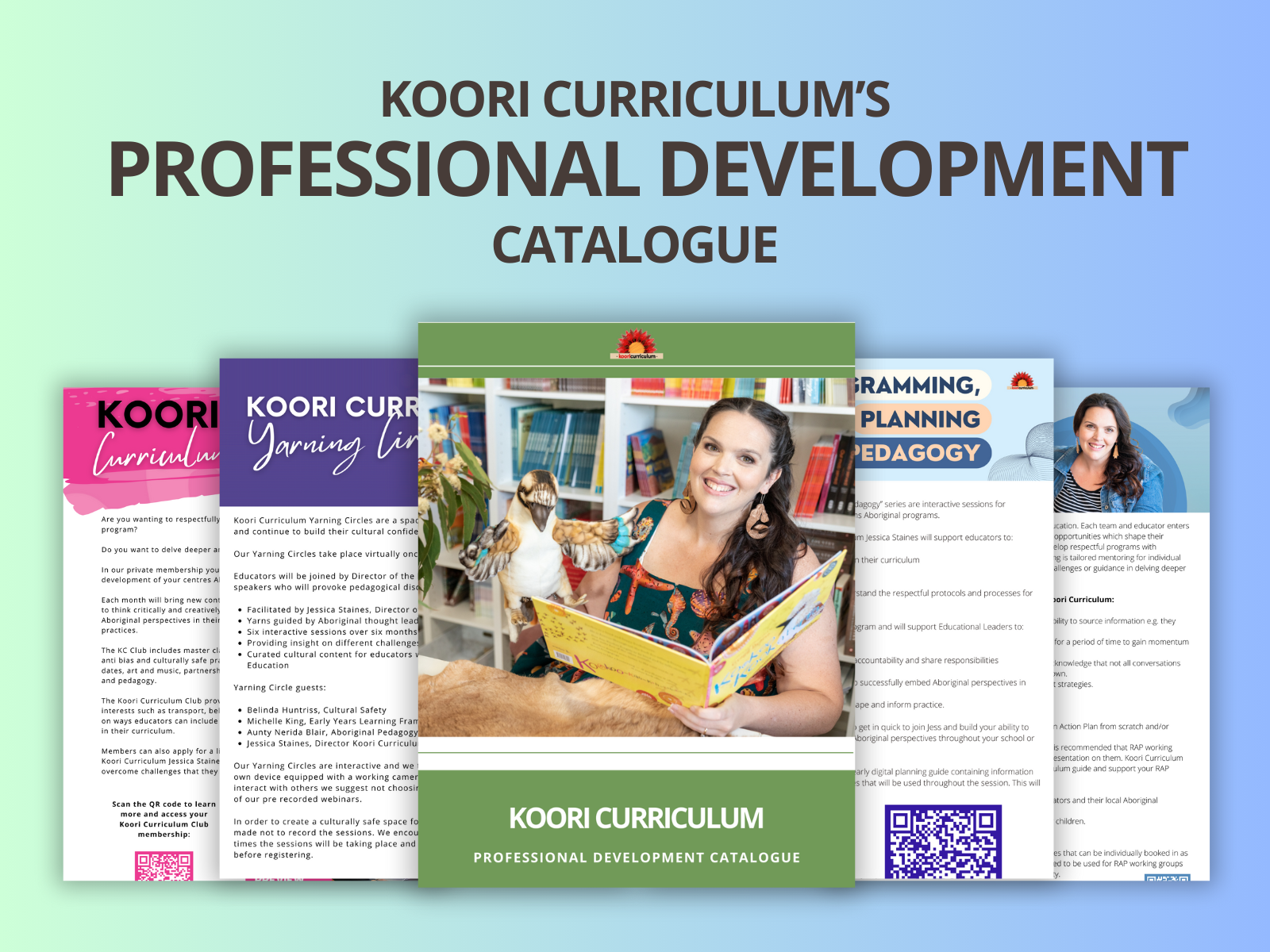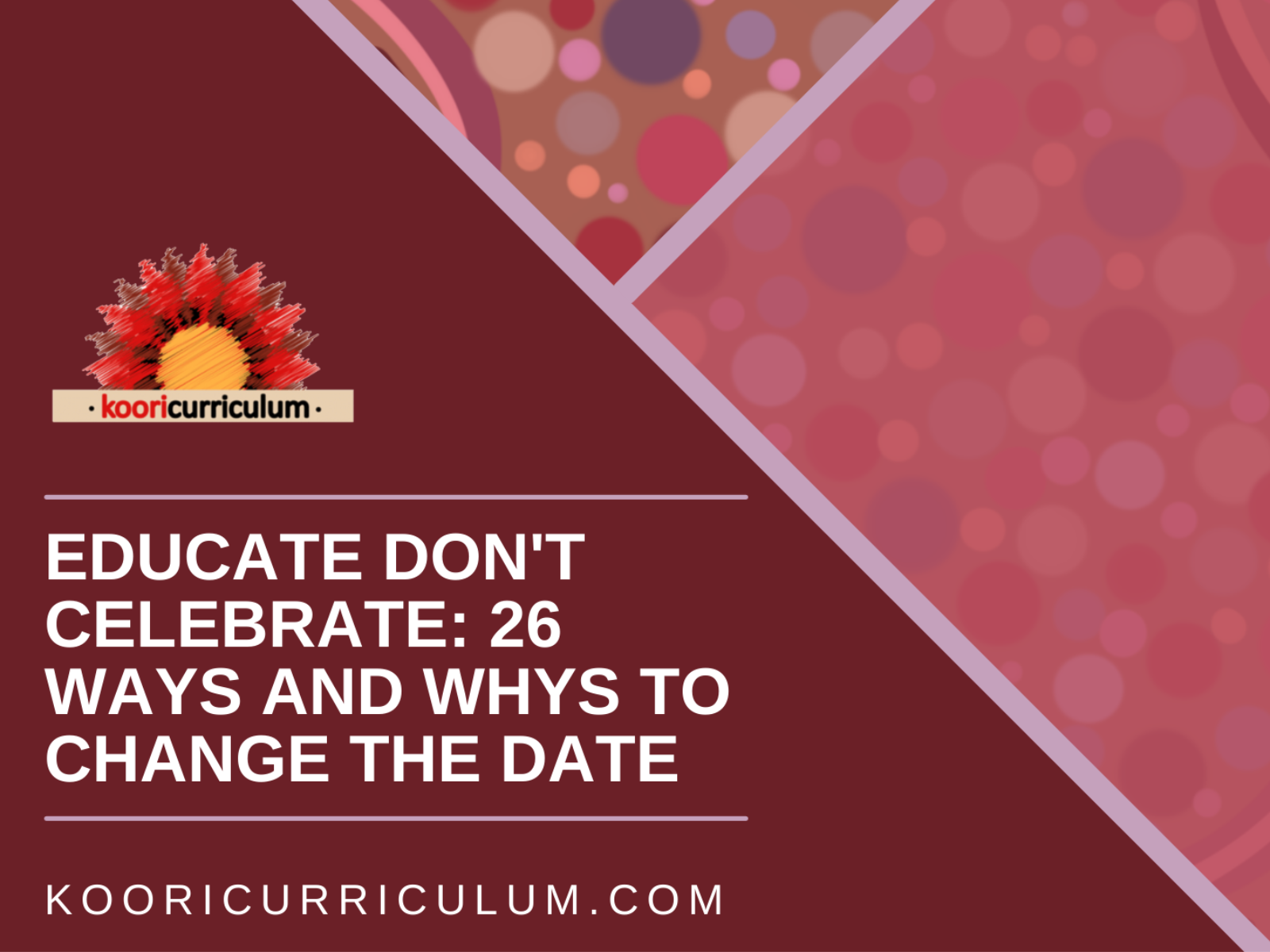
Educator Yarns Episde 12 - My answers to your mostly commonly asked questions
Episode 12 - My answers to your mostly commonly asked questions
Show Notes (transcript)
Welcome to the Koori Curriculum Educators Podcast. My name is Jessica Staines, Wiradjuri woman, early childhood teacher, and director of the Koori Curriculum. I would like to acknowledge the dark and young people, the traditional custodians of the land on which this podcast is being recorded. I'd like to acknowledge the elders both past present and emerging and all Aboriginal and Torres Strait Islander listeners.
Many of you would know that our sister company, the Aboriginal Early Childhood Collective has an annual conference. And this year, if you're listening in live time, we have moved these conference online due to the pandemic. And the theme of this year's conference is the Aboriginal early childhood STEM summit. This has over 15 amazing speakers, a combination that of both educators and Aboriginal knowledge holders and thought leaders in the Aboriginal STEM space. So for ideas in this niche area to extend your programme and embrace Aboriginal perspectives and knowledges that you can embed into STEM in your early learning service visit www.aboriginalacc.com.
Today's podcast I'm going to be interviewing myself Jessica Staines, director of the Koori Curriculum, because I recently got an email from a student called Bella who's doing her HST for Aboriginal studies. Her major project is the importance of indigenous culture in early childhood education. And so she shot me through some interview questions and we often get these types of emails from students and also new listeners that are joining our podcast, who aren't as familiar with the Koori Curriculum. So I thought I would share her interview questions with you and my answers to this.
Q: So her first question was, what inspired you to encourage and assist other educators to include Aboriginal perspectives in their curriculum?
So I always say that whilst I identify as a Wiradjuri woman, knowing about your culture and knowing how to transfer that into an early learning service are two very separate things. When I first began working in early childhood, I taught about Aboriginal culture, essentially, if it was a topic, a theme or an interest. However, as I grew personally and professionally, I began to reflect on this and began to feel more so that Aboriginal cultural experiences were tacked on when approaching the work in this way and not truly embedded into the curriculum. It took a bit of time, but eventually I began to use children's interests as that vehicle for learning.
And I holistically planned my curriculum and discovered ways to include Aboriginal perspectives in context, and in a way was meaningful for children. So whilst my pedagogy and practise were developing, I began to realise that other educators are really struggling to respectfully include Aboriginal perspectives in their programme. And I strongly believe that many educators genuinely want to do the right thing, but they just don't know how to go about it and where to start. I also think that there is so much conflicting advice out there, particularly on online forums about what's okay, and what's not okay. And educators really struggled with this [inaudible 00:03:32] and concern of them not wanting to be offensive or tokenistic. And so it was common for us to come across situations where educators were so worried about doing the wrong thing, that they tended to do nothing at all.
One of our elders, so uncle Noel Butler, and many of you may have heard me speak about uncle Noel before. He lives down the South coast on a hundred acres. And his property was a bush rejuvenation site off grid. And earlier this year, so in January, 2020, when New South Wales had the devastating bush fires, he lost his entire property and home. But uncle Noel is a knowledge holder. And he always says to us that our culture is like a smile. It's beautiful and it should be shared with others. And I wholeheartedly believe this. I want our culture to be celebrated and something that both Aboriginal and non-indigenous children can be proud of. And so if it was within my capacity to help other educators to do this work, I absolutely wanted to share with them the resources, the strategies, connections that I had discovered myself as an educator and support them and encourage them to develop their confidence to do the work.
Q: Bella's next question was, what do you feel is the most important aspect of Aboriginal culture to embed in early education?
And for me, I think it really depends. And it's contingent on the community context in which you find yourself working in. So in order to respectfully embed an Aboriginal perspective in an early learning context, we first need to have an understanding of what our community's perspectives are. What do they value? What do they want to be included? How do they want information shared? And the answer to these questions will vary from nation to nation. And I just wanted to reiterate that there is no blanket approach to this, which is potentially what educators struggle with. And for me, when I'm working with a team of early childhood educators, the first thing that I encourage them to do is to begin a reconciliation action plan through [inaudible 00:05:48].
And this is a rap that's specific for early learning services, primary schools and high schools. And when developing a reconciliation action plan, you'll notice that it has three equal parts. Here's what you do in the classroom, what you do around the service, and then what you do out in the community. And I feel that sometimes educators are so fixated almost on how they can embed Aboriginal perspectives in children's interests and create culturally inclusive play spaces that they forget those other two equal parts. So not just what we do in the classroom, but around the service. So our policies, our philosophies, our recruitment, our procurement, and out in the community.
Q: What are the protocols in developing that community stakeholders list.
I really think that for educators, the most important thing for them to do is to develop their cultural capacity and confidence. So making sure that they've engaged in professional development opportunities and that they've gone through a process of listening to community and working with, and there's the saying that we have that nothing for us without us. So research local community protocols and develop a relationship with the local Aboriginal community that's based on reciprocity and respect. Bella's next question was, why do you think services and or educators find it difficult to include indigenous perspectives in their curriculum?
Generally speaking, I think for many Australians Aboriginal culture and history wasn't included or taught well to them during their schooling and many educators need to feel confident in their own learning and understanding before they attempt and begin trying to share this with children. And I think this can often be a quite confronting and vulnerable process of unlearning and relearning. I think that that is really why it's a lack of education, knowledge and understanding. But I think sometimes I feel it's difficult if the early learning service taps on the shoulder and say it's NAIDOC week, it's time to think about what experiences we can do it. There has to be a holistic approach in the service where they're committed to cultural change and what that requires is time and budget to engage and consult with Aboriginal people. To go and attend community events and listen, to have time off the floor to research protocols, to do reflective readings, to ensure that you're doing this work with integrity, there is a process that the team needs to go through.
Time to develop a reconciliation action plan and do professional development training. And I think that's essentially how you get everybody on the same page because everyone has had different relationships, experiences, and opportunities. So it's about closing that gap within your team, that there's this shared space of understanding that you're moving off from together.
Q: How do you support early childhood services and their educators in embedding Aboriginal perspectives throughout their preschools?
So I have two companies. One is the Koori Curriculum. So the Koori Curriculum is an Aboriginal early childhood consultancy that's based in New South Wales. And we work across Australia and the Aboriginal Early Childhood Collective. I'm the co-founder of that, alongside Dr. Red Ruby Scarlet. And we have self-made resources. So the Aboriginal Early Childhood Practise Guide the Aboriginal Early Childhood Planning Guide as well as some online courses. So in June, we are about to launch the Aboriginal early childhood STEM summit, where there are 15 sessions being released across five days, focusing on Aboriginal science, technology, engineering, maths, botany, horticultural practices, agriculture, robotics, all of those good things. We also have a planning course and webinars that we do. So, that's the Aboriginal Early Childhood Collective. And you can find out more about that through www.aboriginalecc.com. But the Koori Curriculum, we have an online Facebook group called the Koori Curriculum Educator Community, which is where you can find me most days, engaging with educators, answering questions, offering advice and support and various resources.
So it's a way that typically after training sessions, it's an open group, anyone can join and have to have come to a training. But I often say to educators at the conclusion of our workshops, that it sort of one-stop shop that they... It definitely is a process and this work takes time. So it's about them going back to their centres and implementing some of the knowledge that they've learnt in their session with me. But it's inevitable that people are going to get stuck. They're going to face challenges and obstacles, and they need to have somewhere to turn. So the Koori Curriculum Educator Community was created for that purpose. That person just aren't left hanging out there on their own, that they've got somewhere to come to when they need advice. We also have this podcast. So the podcast and the community essentially are two free resources that we offer to educators along with fact sheets that we email out fortnightly to educators.
So, if you're not on our email list, you can sign up via our website. So we do like fact sheets on bush talk from Reconciliation Week, different books, experiences that you can do with children. So we email those things out and early childhood is quite a poor profession and there's not often a lot of money in professional development budgets for educators to access. And I didn't want money to be an obstacle, preventing people from gaining knowledge and support to at least begin doing this work. We also, I should mention, we have a blog which gets updated weekly as well, which you can find on our website. We also have a YouTube channel. So we have some cooking experiences. We do a show and tell where I share different Aboriginal artefacts and resources and storytime, which gets updated weekly, three different segments, where I just read different Aboriginal stories for children.
I started this at the moment if you're joining us in real-time, it's where in the middle of the COVID-19 crisis. And a lot of children are being homeschooled. And I created this essentially as a way that children could stay connected and access cultural resources and so forth from their homes because our NAIDOC week and Reconciliation Week events that normally happen annually have been cancelled. We also have a range of online webinars through Koori Curriculum. So next month in May or this month depending on when you're listening. We have two live webinars on how to begin your reconciliation action plans. We have two prerecorded webinars, one on the acknowledgement of country and the other on challenging the culture of celebrations, which you can watch whenever you like. And when it's back to business as normal, we also offer a range of different professional development workshops that we deliver both as in-services and as public events. So there are lots of different ways that we support early childhood educators via different services that we are offering through the Koori Curriculum.
Q: Bella's next question was, do you believe that embedding Aboriginal perspectives in preschools strengthens the services relationship to their local community?
I think many Aboriginal families choose not to attend mainstream early learning services as I feel that they are not culturally safe. However, when educators show up in community, consult with elders and knowledge holders and take steps to create a culturally safe and inclusive service, we do tend to see a shift. And Dr. Sue Atkinson talks about simple things like flying the Aboriginal flag at the front of your service and this flag as being a symbol and a signal to Aboriginal communities to say that they are wanted, they're valued. And that this is a culturally safe and respectful place for them to come to.
So I think for those of you that have reconciliation action plans, flying the Aboriginal flag is an action that they encourage you to undertake. However, if you don't understand why it's always going to be tokenistic, so really it doesn't matter what you do, whether it's good or bad, you could have the most aesthetically pleasing set up that includes an Aboriginal perspective, but if you don't know why you're doing it, it's always going to be a token gesture. So, it's not about what you put on the table top, or what flag you run up the pole. It's about having that intrinsic understanding. But I do think that educators that take those steps to engage with community that show up, that create culturally inclusive play spaces so that when an Aboriginal family walks in the door, they're not grappling trying to find resources or develop their understanding that they've been proactive and responsive and they're inclusive from the onset. And I think that... Yeah, it does change the perspectives of the local community.
Q: Why do you feel embedding Aboriginal culture in early childhood education curriculums is so important?
I think for non-indigenous children, it's about having respect for diversity and for our country's first nations people. So even if all the children in the customer homogenous, that is not the reality of broader Australian society. So it's about promoting an anti-bias curriculum and it's about reconciliation. I think everyone's culture is important. I don't think that Aboriginal culture is any more or less important than anybody else's, but in terms of early childhood curriculums, when we talk about inclusion, we tend to focus on the cultural demographic of the children that we have in the classroom. However, when we look at including Aboriginal perspectives, it's not based upon whether or not there are Aboriginal children enrolled at the service.
You do it regardless because you're teaching on Aboriginal land and respect for these country's first nations people is incredibly important. I think for Aboriginal children, it's a little bit different. It's important to contextualise the curriculum through culture. So when educators take steps to do this, we see our children thrive and reach equal learning outcomes to non-indigenous students. However, we see in the Closing the Gap Report that statistics that are pretty damning, such as Aboriginal children are more likely to end up in jail than what they are to finish high school. However, for Aboriginal people that receive a tertiary level education, there is no gap in life expectancy, social economic status, social participation and so on and so forth. Aboriginal people are on par with non-indigenous Australians. However, for an Aboriginal person to receive a tertiary level education, the work has to begin in the early years. That's what I really believe and it's where we create that positive disposition for children and for families towards education that ensures that smooth transition on into primary school and hopefully follows through on into high school and beyond that.
Q: Bella, says as a leader in your field and an ambassador for embedding Aboriginal culture in early childhood, how do you inspire others? And what do you hope to envision for the future of children in early years education?
So personally I hope that 20 years from now, I won't have a job or as big of a job. So I believe that by supporting educators today that I see a ripple effect occur. And I know already that many parents are learning about Aboriginal culture and the truth of these countries, black history for the first time through their three and four year old children who are coming and sharing with them what they've learned at preschool with their educators. I don't know that I inspire teachers, but I do do the best within my capacity to support and encourage. I like to think that at the very least, I point people in the right direction. And whilst we do have some services of which there is a monetary cost, we also have many things for free. And as I said before, the reason being is we don't want cost to be a barrier, a preventative from people during the work.
I do want educators to be empowered and I want them to feel supported. And essentially because I know that this work can change the trajectory for Aboriginal children and for our nation as a whole, in terms of taking the next steps and moving forward and reconciliation. So those were the questions that came through from Bella. And I hope that lets you know a little bit about me and the Koori Curriculum and our values, how and why we started and what our vision is for the future. What we hope the future looks like anyway. And I will catch you next time. Thanks everyone.



